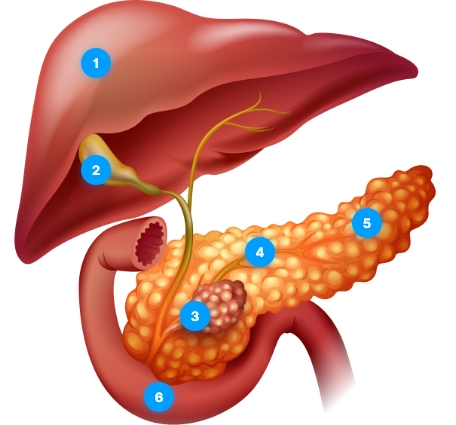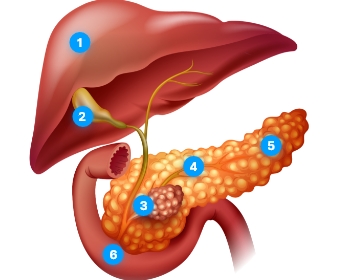Anatomy and Function of the pancreas
The pancreas is a retroperitoneal organ located in the back of the abdomen. It is located behind the stomach and colon, next the duodenum (beginning of the small intestine), to the right of the spleen and below the liver and bile ducts. It is generally divided into 4 parts (head, neck, body and tail). It has a major duct that joins the common bile duct and empties into the small intestine.
It has two types of function:
- Exocrine function – production of enzymes for digestion and
- Endocrine function – production of insulin and other hormones necessary for metabolism.
What is pancreatic cancer?
Pancreatic tumors can originate from both the exocrine and the endocrine parts of the pancreas. Although there are many types of pancreatic tumors, over 90% of pancreatic tumors arise from the ducts and are called “adenocarcinoma”. Tumors from the endocrine part of the pancreas are referred to as neuroendocrine tumors. Pancreas adenocarcinomas are slightly more common in men than in women.


The pancreas includes:
-
1
Liver
-
2
Gallbladder
-
3
Pancreatic tumor
-
4
Pancreatic duct
-
5
Pancreas
-
6
Duodenum
What factors put you at a higher risk of having pancreatic cancer?

Age - people over 45 are at higher risk
Cigarette smoking
Obesity
Alcohol intake
Family history of pancreatic cancer
Diabetes mellitus
Chronic pancreatitis


How is pancreas cancer treated?
Like other cancers, the treatment for pancreatic cancer depends on stage. Because many pancreatic cancers tend to be advanced at the time of diagnosis, treatment usually requires a combination of chemotherapy, surgery and radiation. However, complete removal at the time of surgery remains the most important treatment to attain a cure.
Will surgery be needed for pancreatic cancer?
Your surgeon at Academic Surgical Associates will review your tests and scans very closely and discuss this with our multidisciplinary team of physicians. If the tumor is determined to be operable, we may recommend surgery right away or often a period of chemotherapy before surgery. If the tumor is inoperable initially, we will generally recommend chemotherapy, radiation or a combination to treat the tumor and potentially shrink it to allow surgery.
What is the Academic Surgical Associates difference?
We are experts in the treatment of pancreas cancer and can offer the entire gamut of treatment options from major open surgery to laparoscopic and robotic pancreatectomy. We are also actively researching new ways to treat pancreas tumors such as irreversible electroporation (IRE) and ablation.
Connect With Us